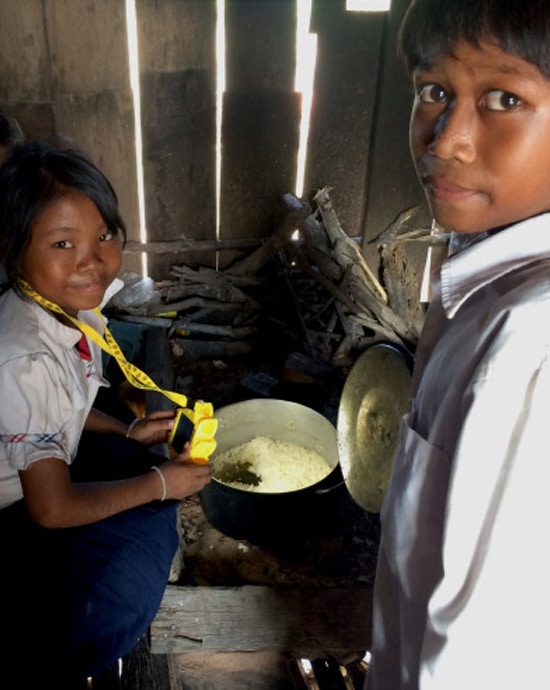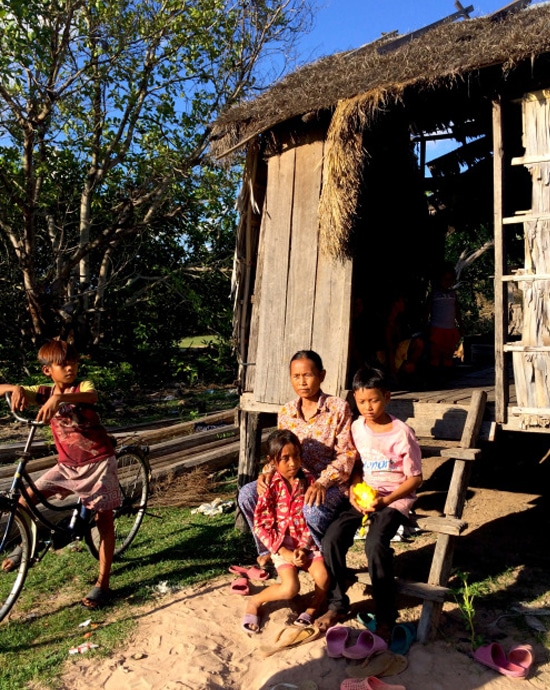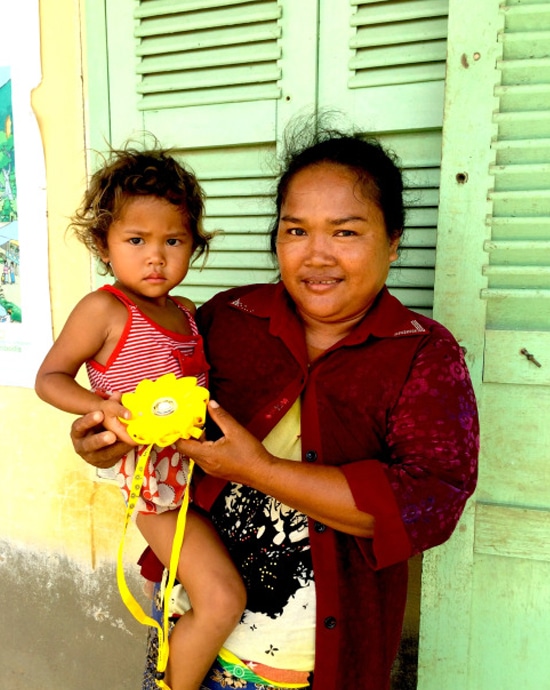If there was ever a question of how deeply light, (and access to it), affects lives, Susie Lachal, Executive Director of the Australian NGO Teachers Across Borders and a PhD candidate at RMIT University, Melbourne, has now felt the answer first-hand: witnessing the immediate effects of how owning even one little solar lamp is making an enormous difference in the lives of the Cambodian villagers she worked with.
Last year, Susie took it upon herself to distribute ten Little Sun lamps in Cambodia as part of her other projects and research. This is her inspiring story.

10 Little Suns travel to Cambodia with Teachers Across Borders Australia by Susie Lachal
I was lucky enough to travel to Cambodia on holiday in 2003 and fell in love with the country and its people. Now working with Teachers Across Borders (a small NGO established in 2005), I travel regularly to Cambodia to provide professional development for Cambodian teachers.
For the past nine years, Teachers Across Borders has been working with two young men, Narit and Hoart, in Kampong Thom, Cambodia.
Initially, the pair were working behind the desk at the hotel we stayed in each year while working with the teachers in the area.
We would sit and help Narit and Hoart as they taught themselves to read, write and speak English. After a number of years, they both decided to become primary school teachers. They attended the Kampong Thom Primary Teacher Training College and graduated after two years with a teaching qualification.

They were both assigned to rural areas where the school buildings existed but the schools had been closed. They were tasked to reopen these schools and establish an enrolment. With virtually no resources, they have now re-established these two schools: Narit for the past four years and Hoart, two years. The government pays $2.50USD per student per year for materials, however neither school received this for the first year.
This is considered one of the poorest areas in Cambodia, with no electricity. All of the students are supported by the World Food Programme, receiving one bag of rice per family each month. During the wet season, most families move to higher ground for several months, but Hoart and Narit now remain to teach the children whose parents cannot afford or do not have the capacity to move to dryer land.
In late June, 2015, Narit took me to two families who are off-grid and in dire circumstances. Narit became aware of their difficult situations after the children were repeatedly absent from school. He visited their homes to check on them and discovered how difficult their lives were.

Both mothers are widows and while one is able to work and had the support of the women in the houses around her the other had suffered an accident resulting in an acquired brain injury. The visible result is paralysis down the right side of her body and we were told that she also suffers intellectual and psychological difficulties as a result of the acquired brain injury. This family is living in a house 100m from the school, surrounded by rice paddies.
The children with the disabled mother need to work two to three days per week to make some money to buy rice. They forage for mushrooms, dry them and sell them. They also dig for potatoes on nearby farm land and are paid 60 cents (USD) for a full day of work. They have access to water via an artesian well that has a hand pump and is only partly covered. There was no light source in this house.
I first came across Little Sun in my research with a particular interest on how it functions in developing countries – but what also intrigues me is that Little Sun also engages with the people in developed countries as well (with the same products). I realised how much of a difference Little Sun lamps could make in these areas, particularly for children’s education, so I took it upon myself to distribute some lamps here.
A Little Sun for this family will provide an opportunity for them to be able to cook rice more efficiently in the small indoor terracotta, wood-fired stove. The children will also be able to study in the evening with this light.

One of our other members was distributing reusable handmade sanitary products and we were able to spend time with the women communicating through Narit what the products were for and how they were used. I’ll never forget the gales of laughter as I demonstrated the use of the products over my long skirt – traditional teacher’s attire – an instant feeling of connection with the women. This family was embraced by their local community.

Narit grew up in this immediate area and now is relatively prosperous as he is also employed casually by the hotel for maintenance and his wife owns a small shop on the highway. They have a son who is 11 years old and twins (a girl and boy) who are 12 months. His parents and brother still work their land and Narit supports them as the only member to have received a tertiary education. Narit is committed to his community to ensure these children receive the best education possible with very limited resources.
His attendance rates as a percentage are greater than the schools nearby due to this commitment. The school draws students from a five kilometre radius and most children walk to and from school each day. If they are lucky they get a lift on the front or back of Narit’s motorbike on his way to or from school. He now has 45 students in his school and teaches Grade One from 7.30-11.00 am and grades Two, Three and Four from 1.30 to 5.00pm, six days per week.

Power was put in through this area one year ago. This year we helped Narit connect power to the school so that he can introduce computers in the future at a cost of $250.
The power lines were constructed along the roadside through families’ blocks and through the school yard, resulting in the destruction of most of the trees that provided shade in this hot tropical climate. Narit will distribute three more Little Suns in this area to those who are most in need.

The area Hoart works in is completely off-grid and Hoart and his family were using a kerosene lamp for light. Little Sun will now make their lives cleaner, cheaper and easier, especially for cooking and working in the evenings. Hoart identified three other families in need of a Little Sun and I was able to show two girls and one mother how they worked. Both Hoart and Narit will report back by email on how the Little Suns are working and whether there is a need for more next year when we return.

Teachers Across Borders Australia (which includes two more branches: USA and Sweden), has just signed our third five-year agreement with the Ministry of Education, Sport and Youth to conduct professional development workshops for teachers and teacher trainees. Teachers from Australia come to Cambodia for five to ten day workshops each year, in one of three provinces; Kampong Thom, Kampong Cham and Battambang. Find out how you can get involved here.
I am really excited about Little Sun Charge and hope to take some of those to friends who live in off-grid areas next year!
All the best,
Susie Lachal


